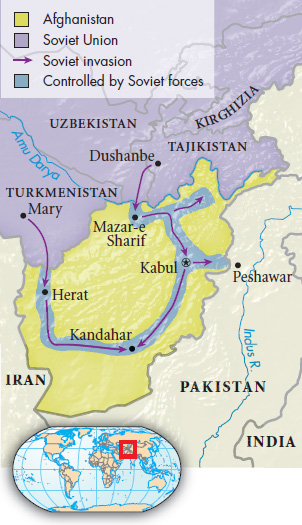A History of Western Society: Printed Page 996
A History of Western Society, Value Edition: Printed Page 1007
From Détente Back to Cold War

The Soviets and the leaders of the Soviet satellite states also faced challenges from abroad as optimistic hopes for détente in international relations gradually faded in the late 1970s. Brezhnev’s Soviet Union ignored the human rights provisions of the Helsinki agreement, and East-West political competition remained very much alive outside Europe. Many Americans became convinced that the Soviet Union was taking advantage of détente, steadily building up its military might and pushing for political gains and revolutions in Africa, Asia, and Latin America. The Soviet invasion of Afghanistan in December 1979, designed to save an increasingly unpopular Marxist regime, alarmed the West. Many Americans feared that the oil-rich states of the Persian Gulf would be next, and once again they looked to the NATO alliance and military might to thwart Communist expansion.
President Jimmy Carter (r. 1977–1981) tried to lead NATO beyond verbal condemnation of the Soviet Union and urged economic sanctions against it, but only Great Britain among the European allies supported the American initiative. The alliance showed the same lack of concerted action when the Solidarity movement rose in Poland. Some observers concluded that NATO had lost the will to act decisively in dealing with the Soviet bloc.
The Atlantic alliance endured, however, and the U.S. military buildup launched by Carter in his last years in office was greatly accelerated by President Reagan, who was swept into office in 1980 by a wave of patriotism and economic discontent. The new American leadership acted as if the military balance had tipped in favor of the Soviet Union, which Reagan anathematized as the “evil empire.” Increasing defense spending enormously, the Reagan administration deployed short-range nuclear missiles in western Europe and built up the navy to preserve American power in the post-Vietnam age. The broad shift toward greater conservatism in the 1980s gave Reagan invaluable allies in western Europe. Margaret Thatcher worked well with Reagan and was a forceful advocate for a revitalized Atlantic alliance, and under Helmut Kohl West Germany likewise worked with the United States to coordinate military and political policy toward the Soviet bloc.